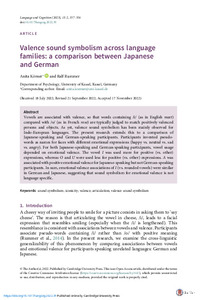Valence sound symbolism across language families: a comparison between Japanese and German
| dc.date.accessioned | 2023-05-08T08:25:12Z | |
| dc.date.available | 2023-05-08T08:25:12Z | |
| dc.date.issued | 2022-12-13 | |
| dc.identifier | doi:10.17170/kobra-202305057957 | |
| dc.identifier.uri | http://hdl.handle.net/123456789/14664 | |
| dc.description.sponsorship | Gefördert im Rahmen eines Open-Access-Transformationsvertrags mit dem Verlag | ger |
| dc.language.iso | eng | eng |
| dc.rights | Namensnennung 4.0 International | * |
| dc.rights.uri | http://creativecommons.org/licenses/by/4.0/ | * |
| dc.subject | sound symbolism | eng |
| dc.subject | iconicity | eng |
| dc.subject | valence | eng |
| dc.subject | articulation | eng |
| dc.subject | valence sound symbolism | eng |
| dc.subject.ddc | 400 | |
| dc.title | Valence sound symbolism across language families: a comparison between Japanese and German | eng |
| dc.type | Aufsatz | |
| dcterms.abstract | Vowels are associated with valence, so that words containing /i/ (as in English meet) compared with /o/ (as in French rose) are typically judged to match positively valenced persons and objects. As yet, valence sound symbolism has been mainly observed for Indo-European languages. The present research extends this to a comparison of Japanese-speaking and German-speaking participants. Participants invented pseudo-words as names for faces with different emotional expressions (happy vs. neutral vs. sad vs. angry). For both Japanese-speaking and German-speaking participants, vowel usage depended on emotional valence. The vowel I was used more for positive (vs. other) expressions, whereas O and U were used less for positive (vs. other) expressions. A was associated with positive emotional valence for Japanese-speaking but not German-speaking participants. In sum, emotional valence associations of I (vs. rounded vowels) were similar in German and Japanese, suggesting that sound symbolism for emotional valence is not language specific. | eng |
| dcterms.accessRights | open access | |
| dcterms.creator | Körner, Anita | |
| dcterms.creator | Rummer, Ralf | |
| dc.relation.doi | doi:10.1017/langcog.2022.39 | |
| dc.subject.swd | Japanisch | ger |
| dc.subject.swd | Deutsch | ger |
| dc.subject.swd | Valenz <Linguistik> | ger |
| dc.subject.swd | Lautsymbolik | ger |
| dc.subject.swd | Ikon | ger |
| dc.subject.swd | Artikulation | ger |
| dc.type.version | publishedVersion | |
| dcterms.source.identifier | eissn:1866-9859 | |
| dcterms.source.issue | Issue 2 | |
| dcterms.source.journal | Language and Cognition | eng |
| dcterms.source.pageinfo | 337-354 | |
| dcterms.source.volume | Volume 15 | |
| kup.iskup | false |
Files in this item
This item appears in the following Collection(s)
-
Artikel [1109]


